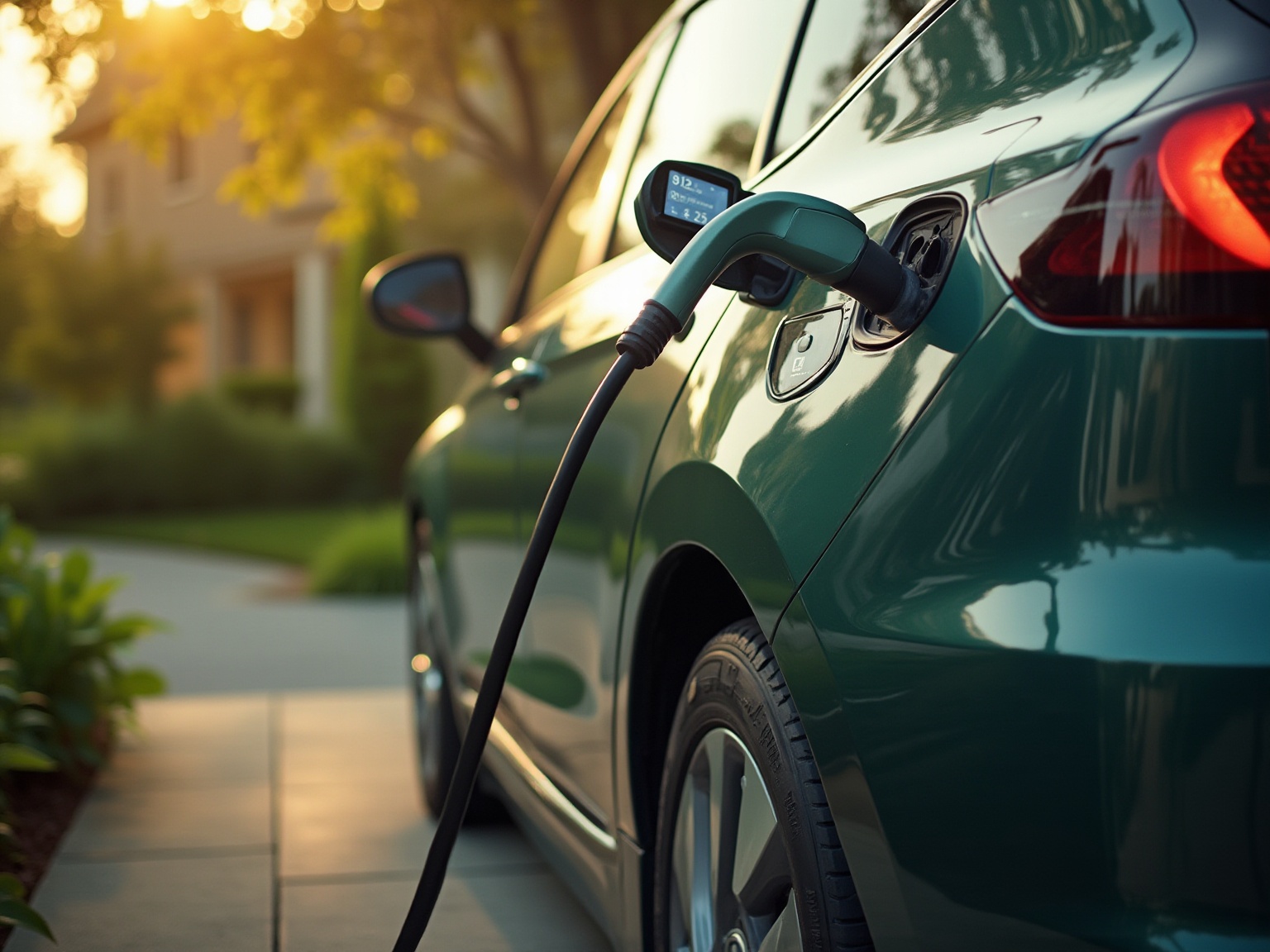Overview
The article titled “Understanding Electric Cars Electricity Consumption: An In-Depth Tutorial for Eco-Conscious Homeowners” addresses the pressing concerns many homeowners have about rising energy bills. It delves into the electricity consumption of electric vehicles (EVs), which typically ranges from 0.2 to 0.4 kWh per mile. By utilizing solar power for charging, homeowners can not only manage these costs but also significantly reduce their utility expenses and carbon footprint. This transition to electric transportation not only highlights efficiency but also brings forth meaningful environmental benefits.
We understand that the journey towards energy independence can feel daunting. However, embracing solar energy is a powerful step towards alleviating financial burdens while contributing to a sustainable future. Together, we can explore how adopting electric vehicles can lead to a more eco-friendly lifestyle, ultimately fostering a sense of community among like-minded individuals.
As you consider this transition, reflect on your current energy habits. Are you ready to take action towards a greener future? Let us support you in making informed choices that benefit both your household and the environment. By working together, we can pave the way for a brighter, more sustainable tomorrow.
Introduction
The rise of electric vehicles (EVs) represents a crucial turning point in our transportation journey, offering not only efficiency but also a significant reduction in environmental impact. We understand that many homeowners are concerned about rising energy bills and the effects of climate change.
Unlike traditional gasoline-powered cars, EVs operate on electric motors powered by rechargeable batteries, showcasing a remarkable shift towards sustainable mobility. This article invites you to explore the intricate workings of electric vehicles, highlighting their key components, energy consumption patterns, and the myriad benefits they offer to eco-conscious homeowners like you.
As we collectively grapple with climate change and seek cleaner alternatives, understanding the technology behind EVs and their role in reducing carbon footprints becomes essential. With advancements in battery technology and charging infrastructure, the future of electric vehicles is not just bright—it’s a vital part of our shared quest for a sustainable energy landscape.
Together, we can embrace this change and work towards a greener future.
How Electric Cars Operate: The Basics of Electric Vehicle Technology
Battery-powered transports operate using a motor fueled by a rechargeable battery, marking a significant shift from conventional internal combustion engines that depend on gasoline. This shift to electric power includes several vital elements that collaborate to provide effective performance:
- Electric Motor: This part is responsible for transforming electrical power into mechanical power, allowing the transport to move.
- Battery Pack: The battery retains power and delivers it to the motor, playing an important role in the transport’s overall efficiency and range. Understanding battery capacity and power ratings is essential for homeowners looking to manage their energy consumption effectively.
- Charging System: This system allows the battery to be replenished from an external power source, ensuring that the vehicle remains operational and ready for use. Home Level 3 devices from Powercore Electric are especially advantageous for EV owners, offering quicker power solutions that enhance convenience and efficiency. These chargers incorporate advanced technology that decreases charging time considerably, making them perfect for busy households.
The efficiency of motors is notably higher than that of gasoline engines, often exceeding 90%. This remarkable efficiency means that a greater proportion of the energy stored in the battery is utilized for propulsion, making EVs a more sustainable choice for eco-conscious homeowners. In fact, studies indicate that if all internal combustion engine (ICE) and hybrid vehicles (HEVs) sales of SUVs had been battery-powered vehicles (BEVs) in 2023, approximately 770 million tons of CO2 emissions could have been avoided globally.
However, we understand that the vehicle market is currently experiencing a slowdown in growth due to reduced financial incentives in Europe, which highlights the importance of evolving policies. As the market develops, there is a shift away from dependence on direct subsidies towards budget-neutral ‘feebate’ programs, indicating a transition in how EVs are supported. As advancements in technology continue to drive improvements in motor efficiency and battery performance, current innovations focus on enhancing battery capacity and reducing refueling times, which are critical for increasing the practicality of EVs.
For example, the most recent information emphasizes notable progress in battery technology, featuring new materials and designs that offer extended lifetimes and quicker charging abilities, rendering them perfect for home power management and sustainability.
Real-world instances of motor efficiency in vehicles further demonstrate these advancements. Automotive engineers highlight that the transition to battery power not only decreases power usage but also aids in creating a cleaner environment. Typically, replacing a gasoline-powered vehicle with an EV can reduce the electric cars electricity consumption required for driving by approximately 47%, highlighting the significant advantages of battery-operated vehicle technology.
As Karin Kirk observes, this reduction is slightly below half, highlighting the efficiency improvements linked to EVs.
In summary, understanding how battery-powered vehicles operate and their electric cars electricity consumption is essential for homeowners aiming to adopt sustainable practices. Powercore Electric Inc. supports this transition by offering innovative solar power solutions and EV charging systems, assisting homeowners in decreasing utility costs and enhancing independence. With continuous advancements in battery-powered transport technology, the future appears bright for environmentally aware individuals looking for dependable and efficient travel alternatives.
Customers have reported significant savings on their utility bills after installing Powercore Electric’s Level 3 chargers, further demonstrating the value of investing in sustainable technology.
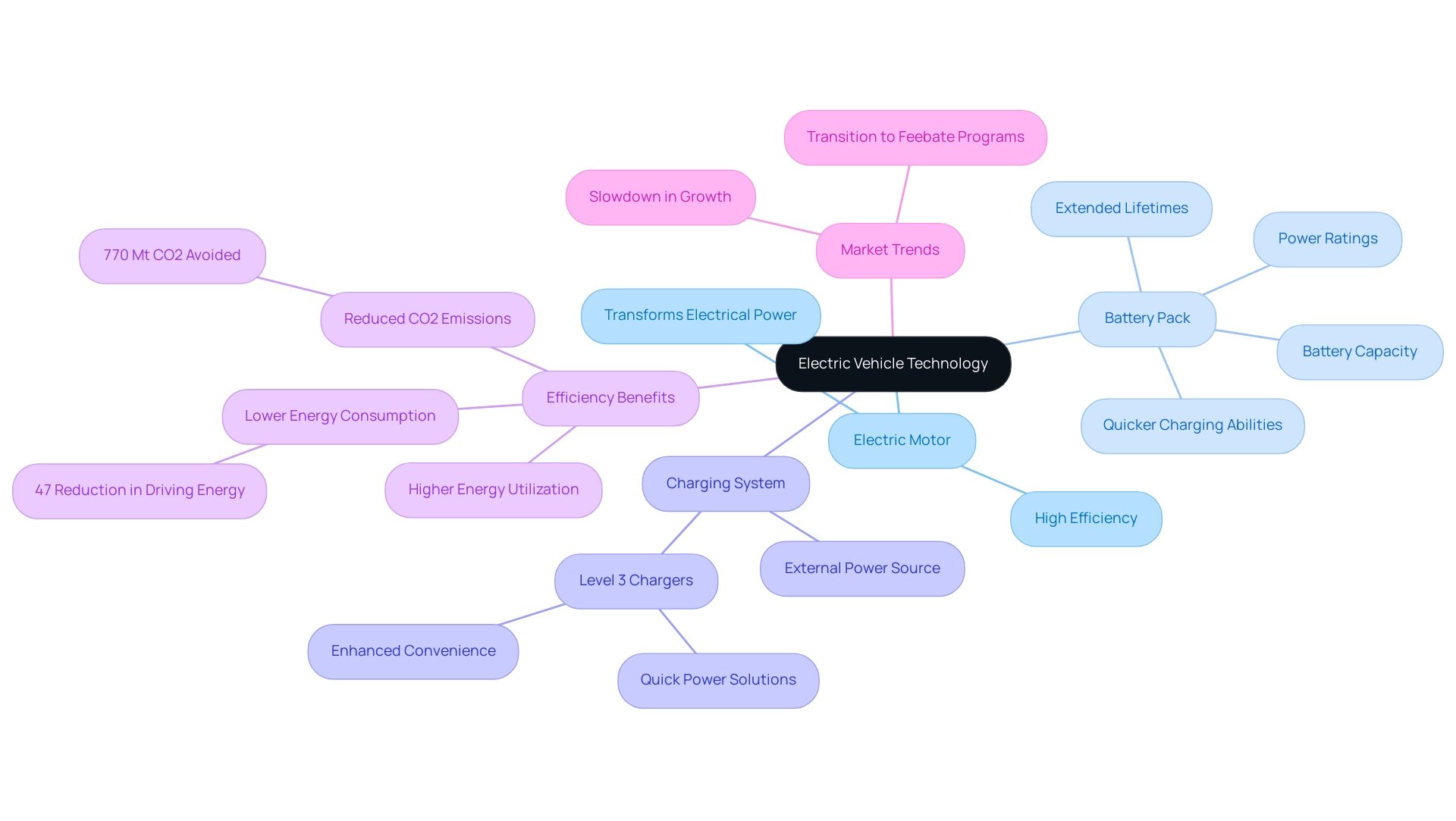
Key Components of Electric Vehicles and Their Impact on Energy Use
Understanding the primary components of electric vehicles (EVs) is essential for homeowners concerned about energy consumption and efficiency. Each element plays a vital role in shaping the driving experience and can significantly impact your energy bills.
-
Battery: The heart of an EV, the battery’s capacity, measured in kilowatt-hours (kWh), is crucial in determining the vehicle’s range and charging time. A larger capacity allows for longer journeys on a single charge, making EV ownership more practical and aligning with the need for efficient resource management in eco-conscious homes.
-
Electric Motor: This component propels the vehicle, influencing both acceleration and top speed. The efficiency of the electric motor is key; more efficient motors convert a greater portion of electrical power into motion, reducing overall costs and enhancing sustainability.
-
Power Electronics: These systems manage the flow of electricity between the battery and the motor, optimizing performance and enhancing efficiency. Efficient power electronics minimize losses during operation, contributing to a more sustainable driving experience and supporting the shift towards renewable power solutions.
-
Power System: Comprising onboard chargers and power ports, the power system determines how quickly the automobile can recharge. For instance, Powercore Electric’s Level 3 chargers offer faster charging, improving the convenience of owning an EV and allowing users to seamlessly integrate battery-powered transport into their daily routines, reducing reliance on traditional power sources.
Each of these elements is integral to the efficiency of battery-powered transportation, affecting both operational expenses and environmental impact. Recent studies indicate that transitioning from gasoline-powered vehicles to electric cars can reduce electricity consumption for driving by nearly 47%. This shift underscores the potential benefits of embracing electric mobility. Additionally, the transportation sector accounts for 70% of U.S. petroleum consumption, highlighting the urgency of this transition.
The health benefits associated with reduced air pollution from EVs further emphasize the broader advantages of adopting electric transportation, resonating with the values of eco-conscious homeowners. As Karin Kirk notes, ‘On average across the U.S., replacing a gasoline-powered vehicle with an EV will reduce electric cars’ electricity consumption required for driving by about 47% — just a bit less than half.’ Powercore Electric Inc. offers innovative EV charging solutions, including Level 3 chargers, to support this transition, helping homeowners lower costs and enhance their independence.
As advancements in EV technology and infrastructure continue, they play a crucial role in promoting sustainable energy practices. Together, we can work towards a cleaner, more efficient future.
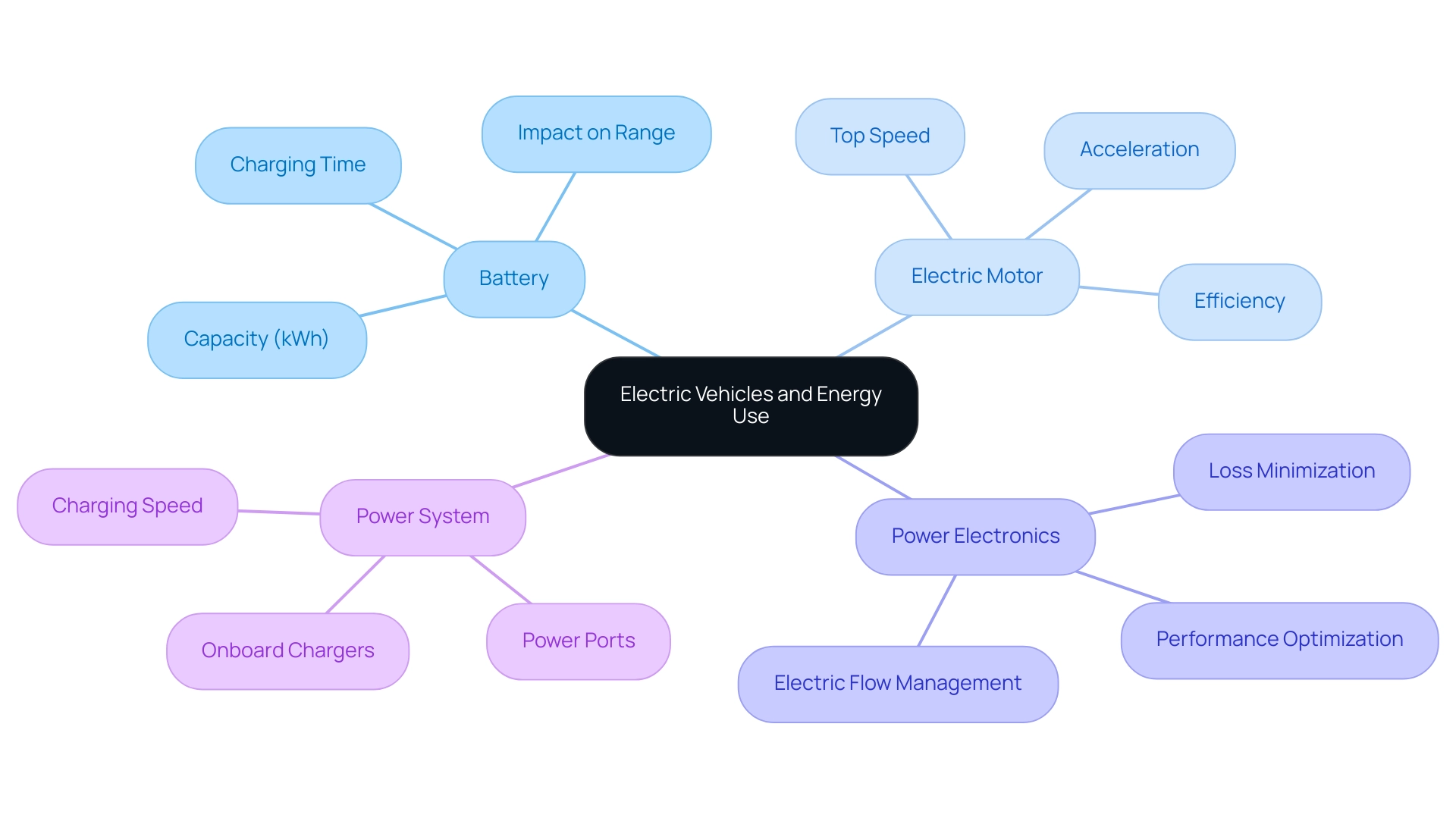
Electric Vehicle Electricity Consumption: What You Need to Know
Electric cars typically consume between 0.2 to 0.4 kWh per mile, with variations based on the model and driving conditions. For instance, compact EVs generally consume around 0.3 kWh per mile, while SUVs and larger models can use up to 0.4 kWh per mile.
We understand that managing electricity consumption is a concern for many homeowners. The advancement of lithium-ion batteries has greatly enhanced the range and efficiency of electric modes of transport, allowing for longer distances on a single charge. For example, consider an EV that consumes 0.3 kWh per mile over a distance of 1,000 miles. This would result in an electricity usage of approximately 300 kWh. Depending on local electricity rates, this translates to an average monthly cost ranging from $30 to $60. However, homeowners can significantly reduce these costs by harnessing solar power for EV charging.
By incorporating solar panels from Powercore Electric into their power systems, homeowners not only power their transports but also lower their overall utility expenses. Powercore Electric offers advanced, affordable solar solutions designed to maximize savings, ensuring that eco-conscious homeowners can charge their EVs sustainably. With our Best Pricing Guarantee and a Seamless, Worry-Free Process, you can trust that you’re making a smart investment.
For instance, the Citroen e-C4, known for its efficiency and distinctive design, offers a battery range of up to 260 miles with an efficiency of 4.38 miles per kWh, making it a practical choice for eco-conscious drivers. Its comfortable ride further enhances its appeal. Additionally, the Tesla Model 3, in standard range form, tops the list of efficient EVs, achieving 305 miles from its 62 kWh battery.
This efficiency highlights the potential for cost savings when using solar power. Powercore Electric’s expert support ensures a seamless, worry-free process for homeowners looking to install solar systems tailored to their needs. As the electric vehicle market continues to evolve, current statistics indicate that the average electricity consumption of electric cars is projected to remain stable, with many models achieving impressive efficiencies. This trend underscores the importance of implementing sustainable power practices, such as solar power, to improve autonomy and lessen dependence on conventional power sources.
With over 30 years of experience serving the California community, Powercore Electric guarantees high-quality installations and maintenance through its in-house team of experts, making them a trusted provider of solar solutions for EV charging. Ready to save on your utility bills? Together, let’s work towards a brighter, more sustainable future. Contact us for your free, personalized estimate today!
Factors Influencing Electric Vehicle Energy Consumption
Electric modes of transport (EVs) are becoming increasingly popular among environmentally conscious homeowners. However, we understand that comprehending electric cars’ electricity consumption is crucial for optimizing efficiency. Several factors significantly influence how much energy an EV uses:
- Driving Habits: Have you ever noticed how your driving style affects your energy bills? The way you operate your vehicle plays a pivotal role in energy consumption. Aggressive acceleration and maintaining high speeds can substantially increase electricity consumption. Studies show that adopting smoother driving techniques can enhance efficiency, leading to savings on your energy costs.
- Geographical Landscape: It’s common to feel frustrated when navigating hilly or mountainous areas. These terrains demand more power for climbing, which affects electricity consumption and can strain your battery, ultimately reducing overall efficiency.
- Weather Conditions: Extreme temperatures can also take a toll on battery performance. Cold weather can diminish battery capacity, while excessive heat may increase electricity consumption due to the need for cooling systems. Being mindful of these conditions can help you plan your trips more effectively.
- Vehicle Load: Carrying extra weight in your vehicle can diminish efficiency. Each additional pound results in a measurable rise in power consumption. Minimizing unnecessary cargo is essential to reduce electricity consumption and enhance your EV’s performance.
- Tire Maintenance: Proper tire maintenance is vital for optimal performance. Under-inflated tires raise rolling resistance, significantly increasing electricity consumption. Regularly checking and maintaining optimal tire pressure can lead to better efficiency, crucial for reducing your overall energy use.
Furthermore, research has created a model that considers the interaction of these various factors, highlighting the complexity of optimizing EV efficiency. In urban settings, advanced intersection management can decrease resource consumption by up to 10%, emphasizing the significance of driving conditions on overall resource use.
To provide real-world context, a case study titled “Electric Cars Electricity Consumption” discusses the factors influencing the efficiency of EVs and methods to reduce power consumption. This research classifies different influences on electricity consumption, underscoring the necessity for a deeper understanding of these elements to improve automobile development and functioning.
To optimize electricity consumption, homeowners should adopt efficient driving practices, ensure proper tire maintenance, and consider the terrain when planning trips. By being conscious of these factors, you can improve your automobile’s efficiency and contribute to a more sustainable power future. As pointed out by specialist Hongdi He, understanding these factors related to electricity consumption is vital for enhancing the advantages of battery-powered transport. Together, we can work towards a greener future by making informed choices about our energy use.
The Impact of Electric Vehicle Charging on Home Energy Bills
Charging a battery-powered vehicle (EV) at home can understandably lead to concerns about rising utility costs. On average, homeowners may notice their monthly electricity consumption increase by approximately 30% after acquiring electric cars, which can significantly affect overall electricity expenses. For instance, if your typical monthly bill is $100, it could rise to around $130 after bringing an electric vehicle into your home.
This increase in power usage primarily stems from the additional electricity required to recharge electric cars. While research indicates that powering an EV with a standard household outlet is feasible, it is notably slower compared to utilizing a Level 2 EV power station, which offers a more efficient and quicker charging experience.
To effectively manage and mitigate these costs, homeowners can adopt several supportive strategies:
- Power During Off-Peak Hours: Many utility companies provide lower rates during off-peak times. By scheduling EV charging during these hours, you can take advantage of reduced electricity expenses associated with your electric vehicle.
- Utilize Solar Power Systems: Incorporating solar panels into your home power system enables you to harness renewable energy sources for powering your EV. This not only helps reduce electricity consumption for your electric vehicle but also lessens your dependence on grid electricity, further lowering your expenses. Powercore Electric offers customized solar solutions designed to assist you in combating rising utility costs while promoting sustainability.
- Install a Smart Charger: Smart chargers can optimize charging times based on real-time rates, ensuring that you charge your EV when electricity is most affordable.
Moreover, it’s encouraging to know that over 40 utility companies provide incentives, such as rebates and discounts, for EV owners to help offset the increased costs associated with electric vehicle charging. This aligns with the pressing need for effective and sustainable transportation policies that encourage the adoption of battery-powered cars.
In practical terms, homeowners who have embraced these strategies often report significant savings on their energy expenses while enjoying the benefits of owning a battery-operated vehicle. This not only contributes to lower electricity consumption but also has a meaningful ecological impact; electric vehicles help decrease carbon emissions and other harmful pollutants that affect air quality and public health. By making informed decisions about your energy practices and leveraging Powercore Electric’s EV solutions, together we can effectively manage your electricity costs while working towards a more sustainable future.
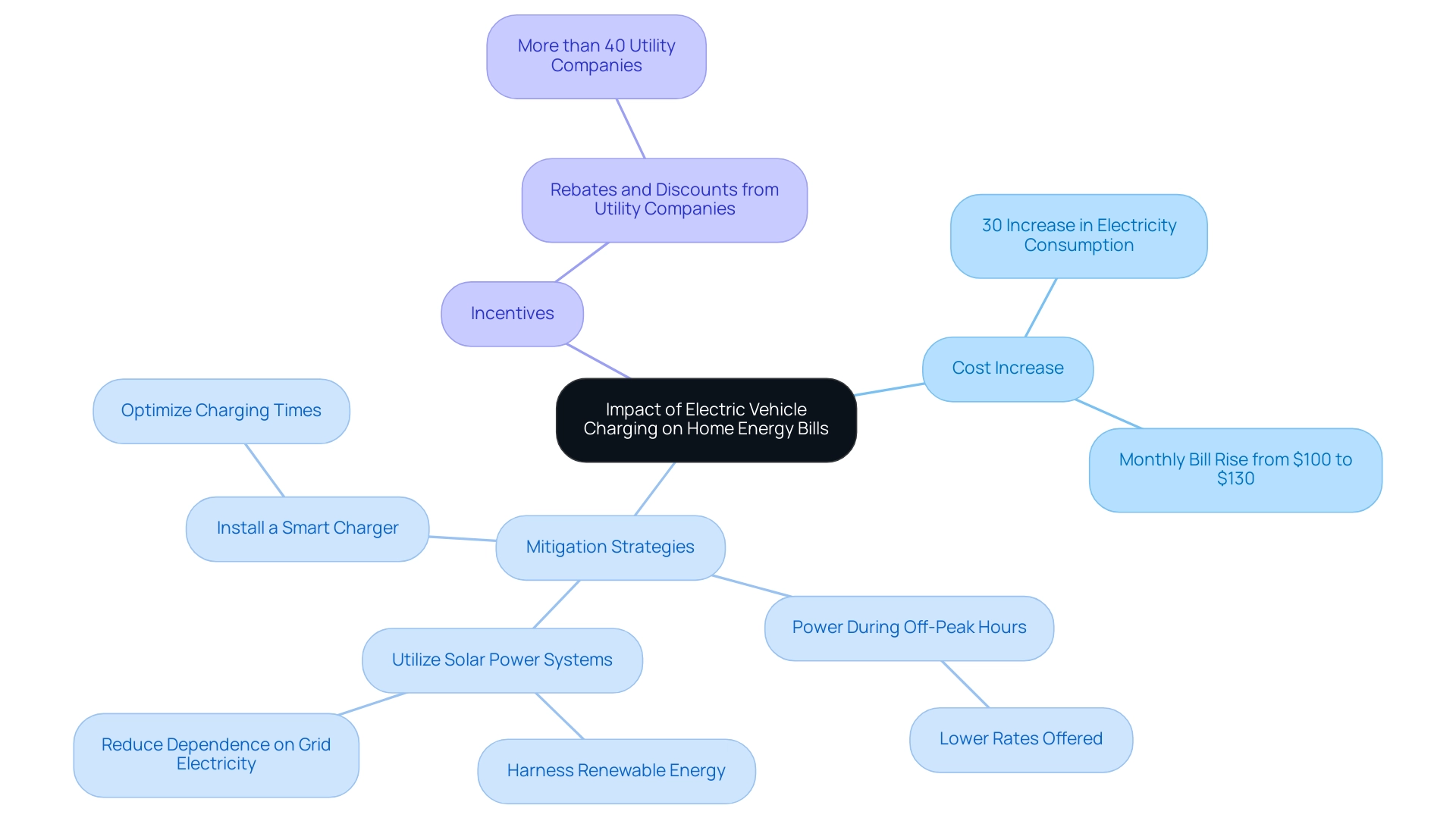
Tips for Reducing Electricity Costs When Charging Your Electric Vehicle
To effectively reduce electricity costs when charging your electric vehicle (EV), we understand that navigating these expenses can be daunting. Consider implementing the following strategies that not only alleviate your concerns but also promote a sustainable lifestyle:
- Install a Home Solar System: Imagine generating your own electricity! By harnessing the sun’s power, you can significantly lower the costs associated with charging your EV. Home solar systems supply clean energy and allow you to take advantage of solar strength during the day, making it especially beneficial for charging your vehicle. Powercore Electric’s internal group of specialists ensures top-notch installations, facilitating a smoother transition to solar power for homeowners while optimizing savings.
- Utilize Time-of-Use Rates: Have you heard about time-of-use (TOU) rates? Many utility companies offer lower electricity prices during off-peak hours. Charging your EV during these times can lead to substantial savings on your utility bill.
- Optimize Your Charging Schedule: Consider setting your EV to charge overnight or during designated off-peak hours. This simple adjustment can maximize your savings by taking advantage of lower electricity rates.
- Invest in a Smart Charger: Smart chargers can automatically adjust power times based on real-time energy rates and demand. This technology enhances convenience and ensures you are powering your vehicle when electricity is most affordable. In fact, an intelligent power system has shown maximum savings of up to 51.9% compared to conventional methods.
- Monitor Your Power Usage: We encourage you to utilize apps or smart meters to keep track of your power consumption. By analyzing your usage patterns, you can identify opportunities for savings and make informed decisions about when to charge your EV.
Incorporating these strategies can lead to significant cost reductions. Moreover, understanding the elements affecting EV refueling savings—such as solar power availability and driving behaviors—can further enhance your power consumption. A case study titled “Factors Influencing EV Charging Savings” emphasizes that savings from powering EVs with solar power rely on several factors, including the solar price delta and the amount of surplus solar power available.
By utilizing solar energy for EV power, together we can lower electricity expenses while contributing to a more sustainable future. As the cumulative private investment in medium- and heavy-duty charging infrastructure in the United States reached USD 4.2 billion by the end of 2023, the significance of efficient charging solutions continues to grow. Let’s work towards a greener tomorrow, one charge at a time.
Environmental Benefits of Electric Vehicles: A Sustainable Choice
Electric vehicles (EVs) offer a range of environmental benefits that significantly contribute to our sustainability efforts, and we understand how important these considerations are for you:
- Reduced Emissions: EVs operate without tailpipe emissions, playing a crucial role in reducing air pollution. This shift is vital as urban areas face challenges with air quality, and adopting EVs is a key strategy in addressing these concerns.
- Lower Carbon Footprint: When powered by renewable sources, EVs have a substantially lower carbon footprint compared to traditional gasoline vehicles. This reduction is particularly impactful as the electricity grid increasingly relies on cleaner sources, leading to greater pollution reductions over time. As Karin Kirk notes, “Over time, electricity is getting less carbon-intensive, so the pollution reductions will only get larger in the coming years.”
- Energy Conservation: Electric cars are remarkably efficient, converting over 85% of electrical power from the grid into power at the wheels. In contrast, gasoline vehicles convert only about 20% of the power stored in gasoline into movement, highlighting the superior efficiency of electric cars.
- Sustainable Power Integration: The ability to charge EVs using solar power enhances their sustainability. Homeowners can harness solar energy to charge their vehicles, effectively reducing reliance on fossil fuels and promoting a cleaner energy ecosystem. Powercore Electric offers solar panel installations to help you maximize your renewable energy usage.
To support the growing adoption of EVs, developing the necessary infrastructure is essential. By 2030, the NZE Scenario requires a stock of 17 million publicly accessible power points, emphasizing the need for robust networks to facilitate this transition. Powercore Electric provides EV station installations to ensure you have convenient power options available.
Furthermore, we encourage governments to support the deployment of publicly available charging infrastructure until there are enough EVs on the road to sustain a charging network.
By choosing an electric car, you not only decrease your personal carbon footprint but also contribute to larger environmental objectives. As governments worldwide enact policies to promote EV adoption, including stricter emissions standards and incentives for zero-emission modes of transport, the market share of EVs is expected to grow significantly. Projections suggest that EVs could represent 70% of total auto sales in the U.S. by 2032, underscoring our collective commitment to sustainable transportation.
In summary, transitioning to battery-powered transportation is a crucial step toward achieving net-zero emissions and fostering a healthier planet. By making this choice, you play an essential role in promoting cleaner air and a sustainable future. For more information on how Powercore Electric can assist you with solar panels, battery backups, and EV charging stations, please reach out to us at ryan.serrano@powercoreinc.net or call (916) 699-8778.
The Future of Electric Vehicles and Their Role in Sustainable Energy
The future of electric vehicles (EVs) is indeed bright, fueled by transformative trends that are reshaping their role in sustainable energy systems.
- Increased Adoption: We understand that many homeowners are concerned about rising energy bills. As technology advances and costs decrease, more individuals are expected to transition to electric vehicles. This shift is not just a personal choice; it mirrors a broader societal movement towards sustainability. Notably, BCG may revise their 2030 projections to include plug-in hybrid electric options (PHEVs) at 8% of total sales, up from the current forecast of 5%, indicating a significant trend in EV adoption that can lead to long-term savings.
- Expansion of Power Supply Infrastructure: It’s common to feel anxious about the availability of charging stations. The proliferation of power stations is crucial for the widespread adoption of EVs. Recent data shows a notable rise in power sources across urban and suburban regions, making it easier for EV owners to recharge their vehicles and alleviating range anxiety. This expansion is supported by governments launching critical raw material funds to bolster investments in the extraction and processing of essential minerals needed for EV infrastructure.
- Integration with Renewable Resources: Together, we can enhance the sustainability of electric cars by relying on renewable sources like solar and wind for charging. This integration not only supports the electricity consumption goals of homeowners aiming to reduce their carbon footprint but also provides an opportunity for energy independence. Powercore Electric offers solar panels and battery backups that can be utilized to charge EVs, making it easier for eco-conscious homeowners to adopt sustainable driving solutions. As Mathilde Carlier, a research expert covering transportation and logistics, notes, “Electric vehicles worldwide are becoming a cornerstone of sustainable transportation.”
- Smart Grid Technology: We recognize that managing energy consumption can be challenging. Innovations in smart grid technology are transforming power management. These advancements facilitate more efficient power replenishment methods, allowing electric cars to consume electricity during off-peak hours or when renewable production is at its peak.
Furthermore, the competitive environment in the EV market is evolving. For instance, Indian start-up BluSmart secured $42 million in growth equity in 2023, highlighting the rising interest and investment in mobility powered by electricity. This competitive analysis underscores the importance of Powercore Electric’s offerings in the context of a rapidly changing market.
To effectively combine battery-powered cars with renewable sources while considering electric cars’ electricity consumption, we encourage homeowners to follow a step-by-step guide:
- Evaluate power requirements and automobile usage;
- Explore solar panel options and battery backups from Powercore Electric;
- Install EV charging stations;
- Monitor power consumption to optimize usage.
Investing in battery-powered transportation today places homeowners at the forefront of a sustainable power revolution. For more information on how Powercore Electric can assist you in this transition, please contact us at ryan.serrano@powercoreinc.net or call (916) 699-8778. As the landscape evolves, the synergy between electric transportation and renewable energy will play a pivotal role in shaping a cleaner, more efficient future.
The dynamics of vehicle registrations, as discussed in the case study “Growth of Electric Vehicles in Operation,” further emphasize the increasing share of environmentally friendly vehicles on the road, reinforcing the importance of this transition.
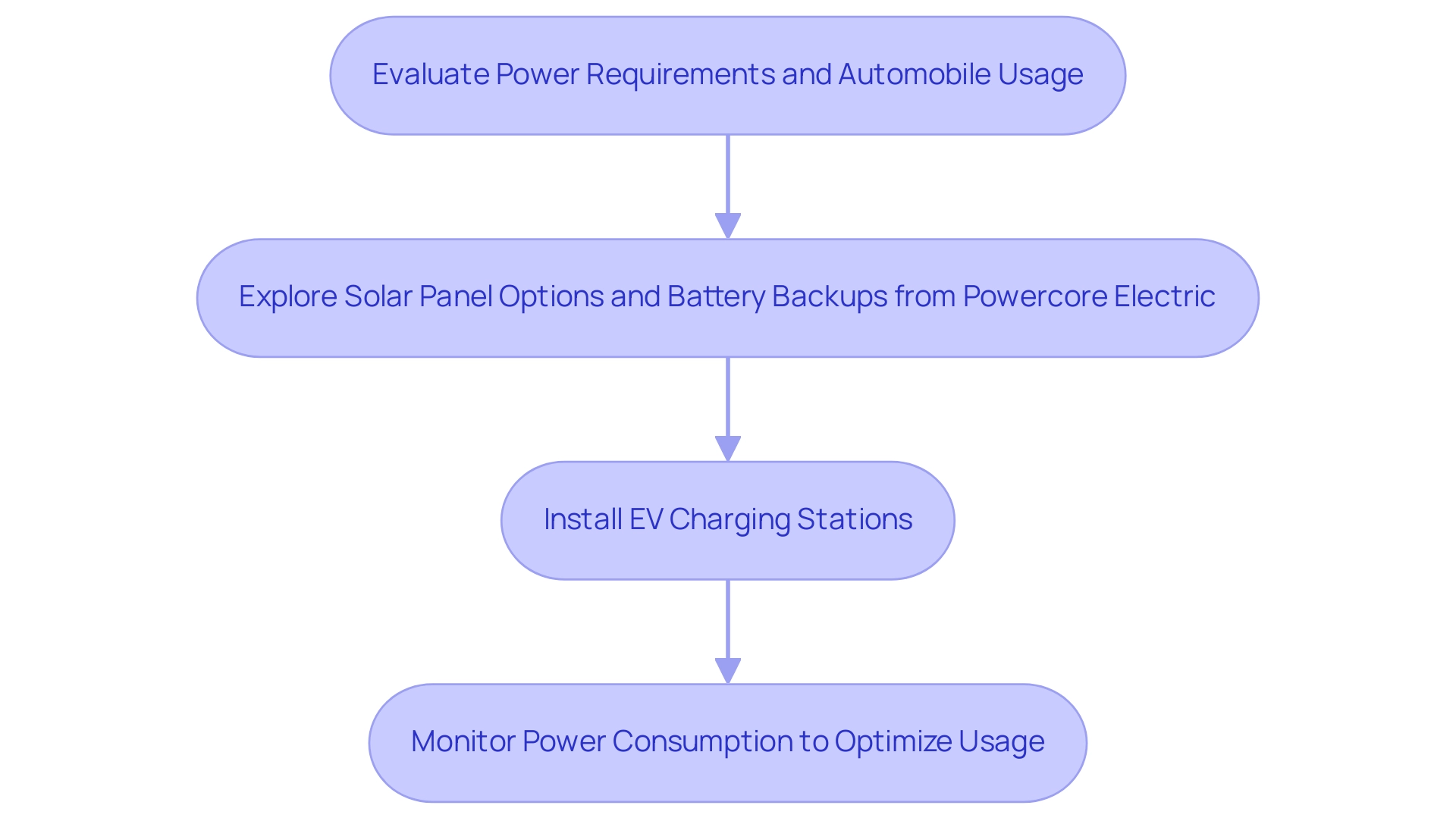
Conclusion
Electric vehicles (EVs) are more than just a trend; they signify a transformative shift towards sustainable transportation, offering numerous benefits for eco-conscious homeowners like you. We understand that energy bills can be a concern, and by grasping the fundamental components of EV technology—including electric motors, battery packs, and charging systems—you can appreciate the efficiency and practicality these vehicles provide. With advancements in battery technology and the integration of renewable energy sources, charging EVs is becoming increasingly accessible and cost-effective.
The significant reduction in energy consumption when switching from gasoline-powered vehicles to EVs highlights the environmental advantages of electric mobility. By adopting strategies such as solar charging and smart charging systems, you can further lower your energy bills while contributing to a cleaner planet. As the market for electric vehicles continues to expand, the infrastructure supporting them is also evolving, making it easier for individuals to make the switch.
Ultimately, transitioning to electric vehicles is a crucial step in our collective effort to combat climate change and reduce carbon footprints. Together, we have the opportunity to lead the way in this movement by investing in EVs and integrating sustainable energy solutions into our daily lives. As the future unfolds, embracing electric vehicles will be essential for fostering a greener, more efficient energy landscape that benefits both individuals and the environment. Let’s work towards a sustainable future, where your choices contribute to a healthier planet.


